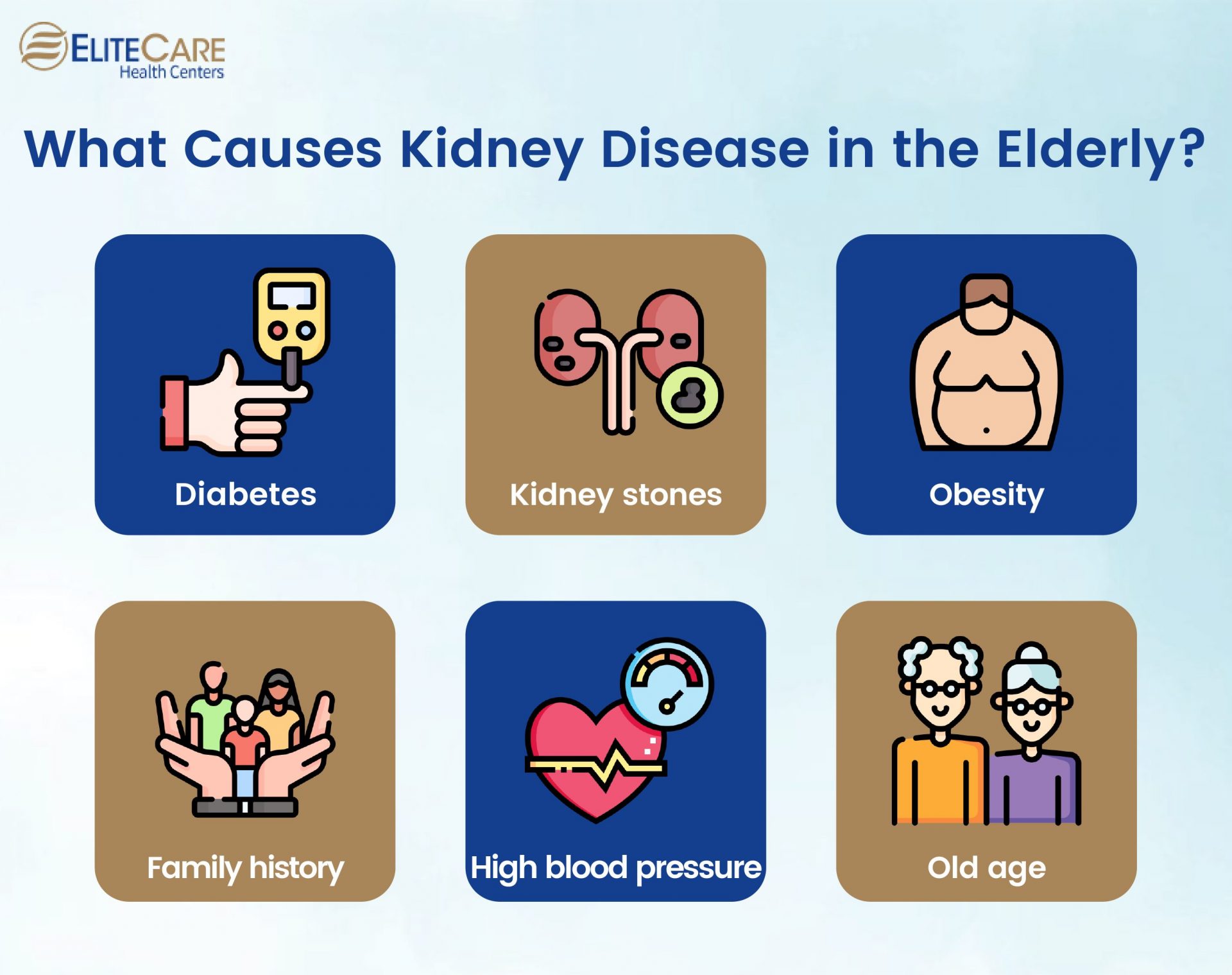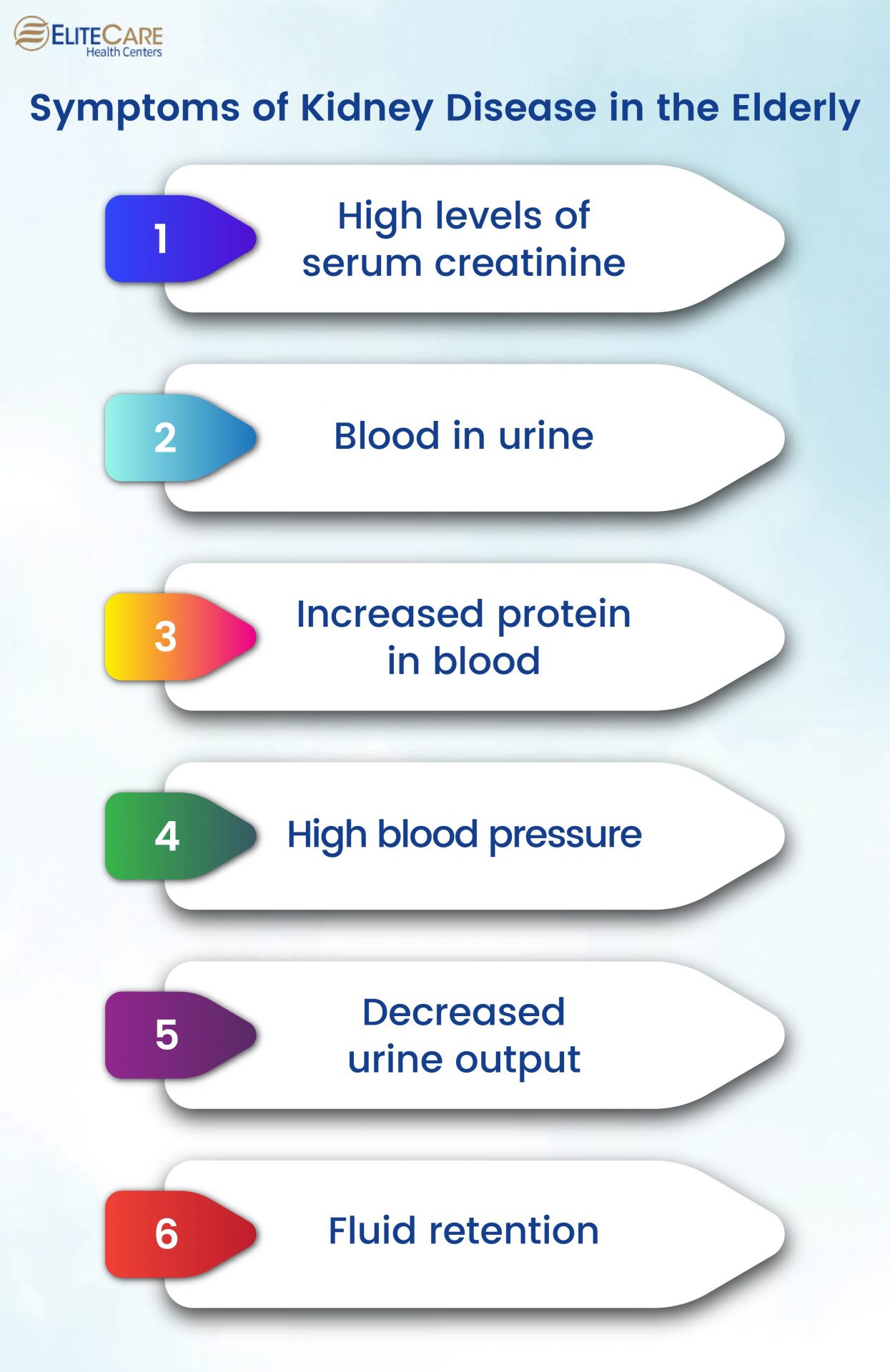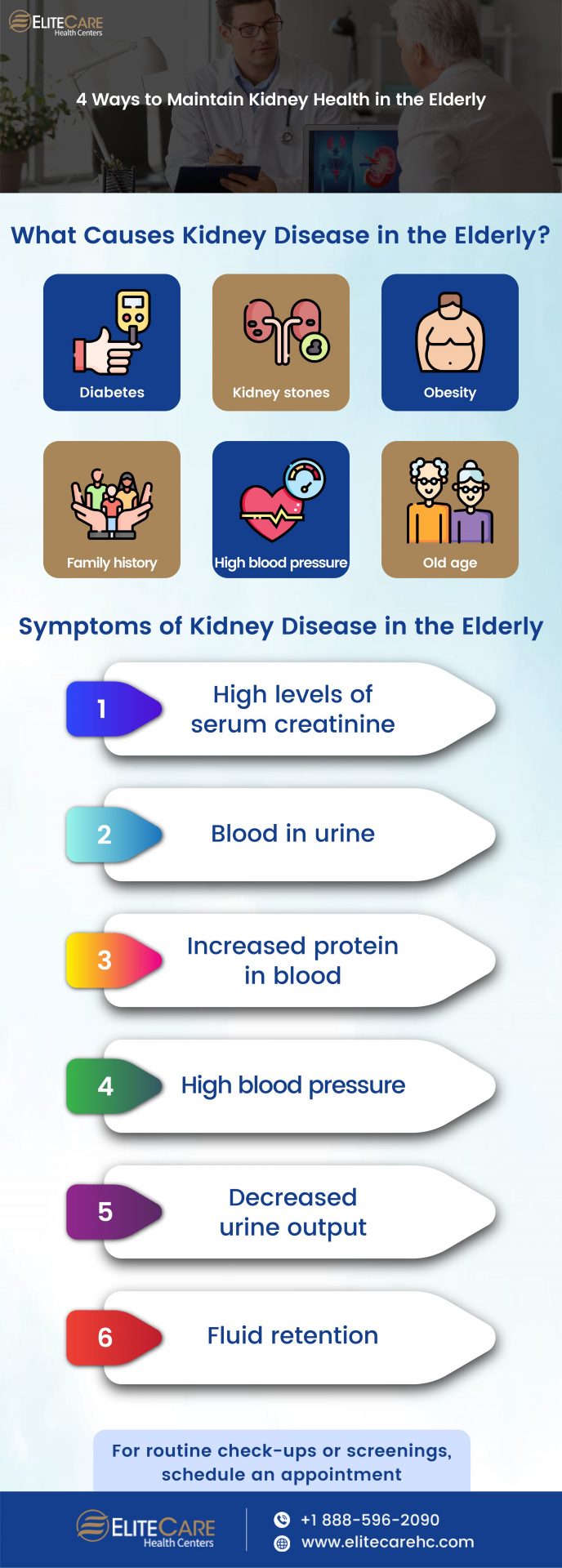
Kidneys are 5-inch-long bean-shaped organs that filter out body waste and create new red blood cells. While most people have two kidneys at birth, only one functional kidney is required to sustain a healthy lifestyle. Each kidney has over a million nephrons which helps remove excess urea from the blood. If kidneys stopped functioning, toxins in the blood would build-up and eventually cause life-threatening complications.
Kidney problems are common in older adults and can pose quite a few health risks. Poor kidney function in the elderly can present itself in the way of urinary incontinence, urinary retention, urinary tract infections and more.
What Causes Kidney Disease in the Elderly?

Age-related functional decline of the kidneys can be due to these reasons:
- Diabetes
- High blood pressure
- Kidney stones
- Obesity
- Family history of kidney disease
- Being over the age of 60
Some other life-style habits that can lead to kidney problems in old age are:
- Smoking
- Drinking
- Not drinking enough water
- Prolonged use of over-the-counter pain medication
- Eating too much animal protein
- Eating processed foods that have high amounts of salt or sugar
- Sedentary lifestyle
Overworking one’s kidneys over the course of a lifetime can have serious health consequences. But like most chronic diseases there will be a fair number of warning signs that can alert one to an underlying kidney issue before it goes out of control.
Read More: A Healthy Lifestyle Plan for Seniors
Symptoms of Kidney Disease in the Elderly.

- Elevated levels of protein in the blood
- Blood in urine
- Elevated levels of serum creatinine
- High blood pressure
- Decreased urine output
- Fluid retention resulting in swollen feet and ankles
4 Ways to Manage Kidney Disease in the Elderly.
Manage Pre-Existing Health Conditions
Diabetes and high blood pressure are the leading causes of chronic kidney disease. In America, 1 in 3 adults with diabetes and 27.5 percent of those with high blood pressure also suffer from kidney disease. Proper management of these conditions can significantly reduce the risk of chronic kidney disease.
As the risk of diabetes and hypertension grows exponentially with age, some lifestyle changes can be adopted to manage them better. Choosing complex carbohydrates like brown rice or legumes over simple ones like white bread and pasta can prevent extreme blood sugar spikes. Eating several small meals instead of three large ones can also keep blood glucose levels in check. As for hypertension, losing excess weight through regular exercise and a healthy diet can help lower blood pressure significantly. For more guidance on nutrition and exercise consult a primary care physician.
Treat Urinary Tract Infections
Older adults are at high risk of urinary tract infections due to urine retention caused by weak muscles in the bladder and pelvic floor. An untreated UTI can not only cause extreme discomfort and pain but can also potentially lead to permanent kidney damage and sepsis. Each instance of UTI needs to be treated immediately before the infection travels up to the kidneys and causes irreversible damage.
Drink More Water
Studies show a promising link between healthy kidney function and increased water intake. Drinking water can prevent kidney stones and filter out excess sodium, urea and osmoles in the body. When the body is dehydrated, kidneys produce concentrated urine which over a course of time can result in kidney disease. It is very important for older adults to drink 6-8 glasses of plain water each day even if they don’t feel thirsty.
Avoid Foods That Are Tough for Kidneys to Process
Processed foods that are high in sodium, sugar and phosphorus can strain the kidneys immensely. So can prolonged use of over-the-counter painkillers and beverages like caffeine or alcohol. In comparison, a diet rich in dark leafy vegetables, berries and fruits are far easier for the kidneys to process. A healthy diet alongside adequate water intake can do wonders for kidney health.
Conclusion
Kidney disease is one of the leading causes of death in America and senior citizens are especially vulnerable to it. Poorly managed kidney disease can seriously affect the quality of life and cause mortality in people of all ages. Therefore, it is crucial to proactively take measures to improve kidney health by adopting a good diet, a regular exercise routine and managing pre-existing health conditions well. It is also helpful to get routine kidney screenings as part of your annual health check-ups to catch functional decline in kidneys early.
EliteCare provides primary care services to cater to the health needs of your elderly loved ones. Visit the nearest EliteCare clinic for health check-ups or visit this website for more information on kidney disease.
- Tags:health and wellness centerhealth and wellness serviceshealth care centerhow to prevent kidney diseaseknee pain treatmentmedical cliniconline doctor consultationprevent kidney diseasepreventive careprimary careprimary care physicianprimary care servicesprimary servicessenior care serviceswellness care centers






